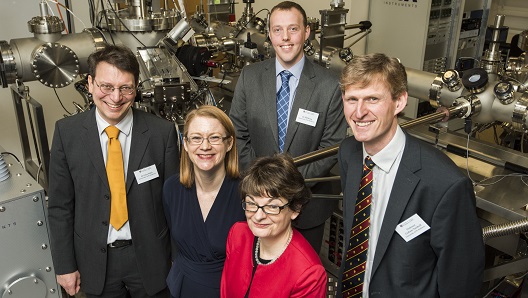Unique centre for designer quantum materials opened by Minister

The Minister for Further Education, Higher Education and Science Shirley-Anne Somerville today (8 December 2016) officially opened a state-of-the-art centre for Designer Quantum Materials at the University of St Andrews.
The centre, the first of its kind in the UK, is aimed at the creation of new materials which do not exist in nature.
Almost like building LEGO structures with single atom building blocks, the Designer Quantum Materials lab allows the composition of a material to be changed between each layer, effectively making entirely new “supermaterials” – combinations and structures which would be impossible to create by any other means.
At the heart of the facility is a molecular-beam epitaxy (MBE) system which can custom engineer materials that can be used in a host of applications from super-efficient energy distribution to high performance computing and sensing.
The facility represents an investment of £2m by the University, the Engineering and Physical Sciences Research Council (EPSRC) and the Scottish Universities Physics Alliance (SUPA) via a Strategic Capital Equipment grant, and builds on previous investment of more than £4m by SUPA, the Scottish Funding Council (SFC) and the University to create a facility that is unique within the UK and one of only a handful with similar capabilities worldwide.
Minister for Further Education, Higher Education and Science Shirley-Anne Somerville said: “I am very proud to be officially opening the centre for Designer Quantum Materials at the University of St Andrews today.
“The School of Physics and Astronomy is already at the forefront of its field, not only in Scotland but also internationally, and this amazing facility will enhance the fantastic work it does.
“We recognise the significant contribution our higher education institutions make to the economy and our society as a whole. That is why this Government continues to invest in the development and application of research, innovation and technology to ensure Scotland remains a productive and competitive nation.”
University Principal Professor Sally Mapstone said: “This facility puts Scotland at the forefront of international efforts to develop new, smart materials which are integral to advances across a multitude of technological challenges and opportunities.
“It is one of only a handful of such centres worldwide and we hope will offer Scottish and UK higher education and industry an unparalleled advantage in this rapidly developing field of exploration.”
Professor Graham Turnbull, Head of the School of Physics and Astronomy, said: “We are very excited to open this facility today, which launches a new era of materials research in St Andrews. The molecular beam epitaxy system will allow us to construct complex crystals atomic layer by atomic layer, or even make electronic devices that are a single atom thick.
“This will allow our research teams to study exotic properties of quantum matter and to engineer new materials that control superconductivity and how electrons and light interact. The research could lead to the next generation of nano-electronic devices for quantum computing, sensors, lighting, and power generation and storage.”
Notes to news editors
The Designer Quantum Materials facility will play an important part in consolidating strong research collaborations with leading research institutes throughout the UK, Europe and the world. It underpins joint research and training programmes such as the Centre for Doctoral Training for Condensed Matter Physics, an International Max Planck Partnership with several Max Planck Institutes in Germany, and an International Max Planck Research School for training in the chemistry and physics of quantum materials.
Picture shows: (rear L to R) Dr Peter Wahl, Dr Philip King, Professor Graham Turnbull; (front l to r) Shirley-Anne Somerville and Principal Professor Sally Mapstone
Issued by the University of St Andrews Communications Office, contactable on 01334 467310/2530 or [email protected].
Category Research